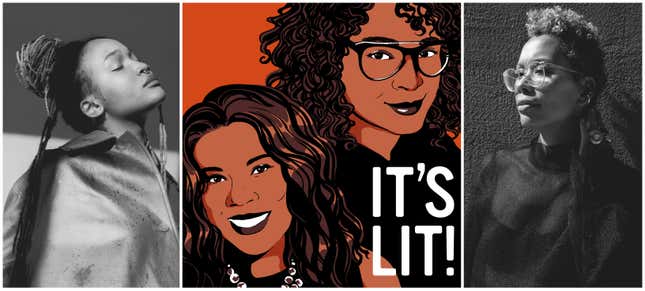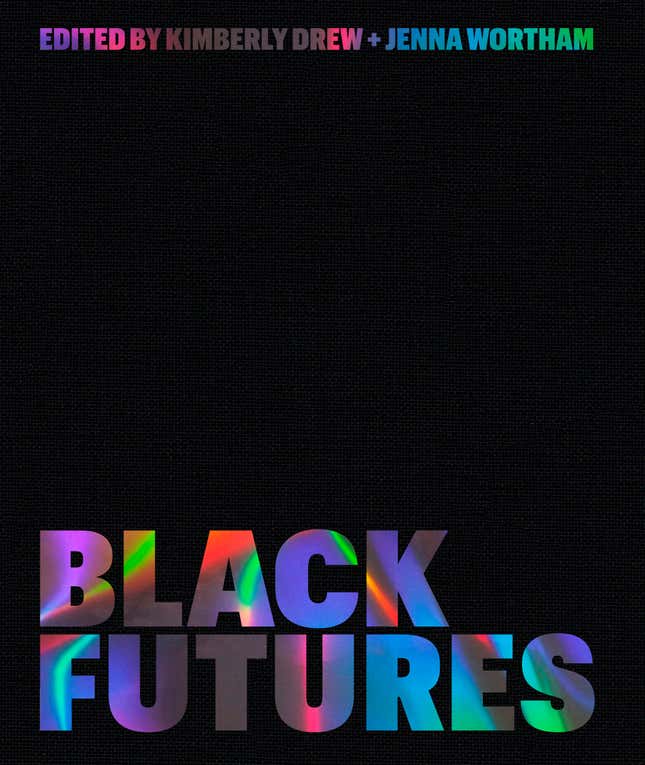
Remember zines? Okay, maybe we’re dating ourselves, but younger versions of The Root’s Editor-in-Chief Danielle Belton and I (Managing Editor of The Glow Up, Maiysha Kai) were early fans of the format, maybe even producing a few zines of our own. (Okay, that definitely happened). Historically, zines organize various creators and mediums around a single topic or theme—so, what would a zine focused on the future—specifically, the future of Blackness—look like?
This is the question answered by Black Futures, a weighty and gorgeously bound compendium of Black creativity edited by 2020 The Root 100 honoree Kimberly Drew (aka “Museum Mammy”) and New York Times Magazine Staff Writer Jenna Wortham, due for release on December 1 from the Penguin Random House imprint One World. At over 500 pages, it’s more like an encyclopedia than a zine, but as the duo recently told Danielle and me during a taping of The Root Presents: It’s Lit!, the zine spirit is alive and well in its creation...even if they weren’t exactly sure what Black Futures would become when it began. (Which is an apt metaphor for...the future, no?)

“I wanted to do something more with arts and culture that centered Black people and Blackness in a way that wasn’t entirely possible at my job,” Wortham explained. “I didn’t really even have the idea for Black Futures, I just knew that there was something really profound happening in arts and culture that I wanted to spend more time thinking about and working on, and I thought Kimberly might be a really good intellectual partner for that. And so I reached out and originally I thought, ‘Oh, maybe we’ll just do something really ephemeral, a short one-off,” she continued. “I really had no idea what I was talking about at all. And then Kimberly had this incredible insight, like, ‘We should think about a book, you know?’ And I was like, ’Whoa. Yes.’ And so, that was kind of the moment that Black Futures started to take shape.”
When Black women gather, something incredible happens...and with over a hundred creatives from across genres and mediums—ranging from very well known to emerging talents—contributing to Black Futures, the resulting book is a testament and tribute to the incredible diversity within Black culture as well as our tremendous collective power.
“There is this book that was created and then there’s this entire universe that exists around it,” said Drew. “I think I can speak for both Jenna and I—we had this incredible anxiety of like, ‘What if it’s not enough? What if it’s not this enough or this group is excluded or this is excluded?’ And we kept talking about the architecture and trying to really point to people who could maybe be representatives for groups of thought or schools of thoughts or directions. And so it’s a really hardy mix of humility, vulnerability, and trust...because it really comes from such a like a deeply soul-centered kind of space, more than like an ego-driven or nepotistic kind of journey...it felt like an excavation at every turn and corner.”
We often joke about “the gift that keeps on giving,” but as an inspiring cultural touchstone that can be returned to again and again, Black Futures is in fact, that gift (and at $40, a very well-priced one, considering the multitudes within its pages—just saying). The book is available for preorder now, but hear our absolutely magical conversation with the visionary and delightful Wortham and Drew on Episode 10 of The Root Presents: It’s Lit: Going Black to the Future with Kimberly Drew & Jenna Wortham, now available on Apple, Spotify, Stitcher, iHeart Radio, Google Podcasts, Amazon, NPR One, TuneIn, and Radio Public. Also available is a transcript of this week’s episode.

